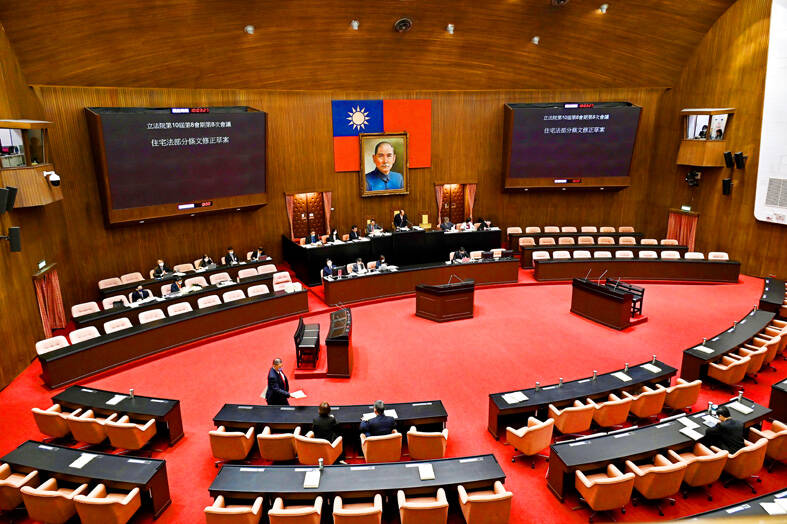The Legislative Yuan yesterday passed a bill allowing courts to issue restraining orders to prevent people from disseminating explicit images of a person without their consent, with provisions aimed at individuals and online service providers.
The bill, which amends the Domestic Violence Prevention Act (家庭暴力防治法), would allow courts to issue civil protection orders prohibiting the remaking, dissemination, broadcast, delivery or publication of intimate images of a protected individual.
Perpetrators would also be required to return any images to victims, and law enforcement officials can order them to delete the content if necessary.

Photo: Tu Chien-jung, Taipei Times
Online service providers would be required to remove or restrict access to intimate images on their Web sites when they discover such content, or when they are informed about its existence by government agencies or law enforcement.
Any content to be deleted would have to be kept by service providers for 180 days while law enforcement officials investigate the incident.
If service providers contravene the law, they could be fined up to NT$600,000, the bill says.
The legislation would also require restraining orders — which normally have a two-year limit — to remain in effect until a court metes our a final ruling if they expire while efforts are being made to change or extend them.
Under current law, restraining orders are allowed to expire while a change or extension is being considered, leaving the person who asked for protection vulnerable.
The proposed amendments would also grant police permission to arrest abusive partners who do not live with the victim, as well as expand the scope of protective orders.
Under the amendment, if a current or former intimate partner physically harms or mentally abuses a victim, police would be allowed to arrest the perpetrator, even if they do not live together.
Regarding protective orders, the amendment expands their scope to prohibit abusers and their close family members from accessing information about a victim or their underage children.
The amendments would also allow for those who were abused by family members when they were minors to change their household registration and prohibit their immediate relatives from accessing their personal information, as long as certain criteria are met.
The amendments also provide same-sex partners the same protections by changing the definition of “in-laws” to refer to the relatives of each partner within four degrees of biological relation.

A car bomb killed a senior Russian general in southern Moscow yesterday morning, the latest high-profile army figure to be blown up in a blast that came just hours after Russian and Ukrainian delegates held separate talks in Miami on a plan to end the war. Kyiv has not commented on the incident, but Russian investigators said they were probing whether the blast was “linked” to “Ukrainian special forces.” The attack was similar to other assassinations of generals and pro-war figures that have either been claimed, or are widely believed to have been orchestrated, by Ukraine. Russian Lieutenant General Fanil Sarvarov, 56, head

SAFETY FIRST: Double the number of police were deployed at the Taipei Marathon, while other cities released plans to bolster public event safety Authorities across Taiwan have stepped up security measures ahead of Christmas and New Year events, following a knife and smoke bomb attack in Taipei on Friday that left four people dead and 11 injured. In a bid to prevent potential copycat incidents, police deployments have been expanded for large gatherings, transport hubs, and other crowded public spaces, according to official statements from police and city authorities. Taipei Mayor Chiang Wan-an (蔣萬安) said the city has “comprehensively raised security readiness” in crowded areas, increased police deployments with armed officers, and intensified patrols during weekends and nighttime hours. For large-scale events, security checkpoints and explosives

PUBLIC SAFETY: The premier said that security would be tightened in transport hubs, while President Lai commended the public for their bravery The government is to deploy more police, including rapid response units, in crowded public areas to ensure a swift response to any threats, President William Lai (賴清德) said yesterday after a knife attack killed three people and injured 11 in Taipei the previous day. Lai made the remarks following a briefing by the National Police Agency on the progress of the investigation, saying that the attack underscored the importance of cooperation in public security between the central and local governments. The attack unfolded in the early evening on Friday around Taipei Main Station’s M7 exit and later near the Taipei MRT’s Zhongshan

REBUFFED: In response to Chinese criticism over recent arms sales, Washington urged Beijing to engage in meaningful dialogue instead of threats and intimidation Washington’s long-term commitment to Taiwan would not change, the US Department of State said yesterday, urging Beijing to stop pressuring Taiwan and engage in meaningful bilateral dialogues. The remarks came in response to a backlash from Beijing about Washington’s latest approval of arms sales to Taiwan. The US Defense Security Cooperation Agency said in a statement on Wednesday that the Taipei Economic and Cultural Representative Office in the US has asked to purchase an arms package, including Tactical Mission Network Software; AH-1W helicopter spare and repair parts; M109A7 self-propelled howitzers; HIMARS long range precision strike systems; tube-launched, optically tracked, wire-guided missiles; Javelin